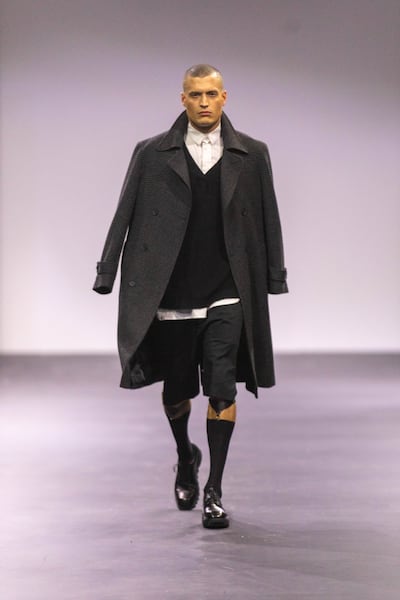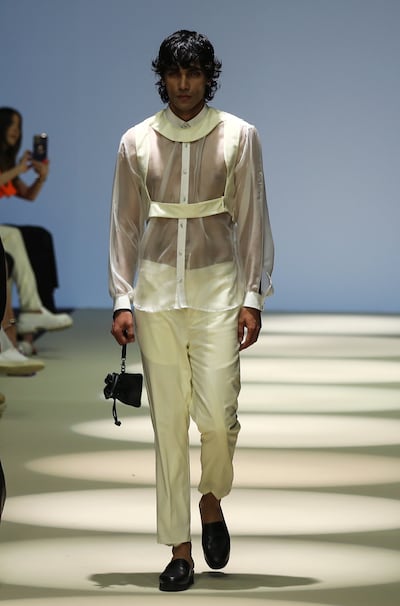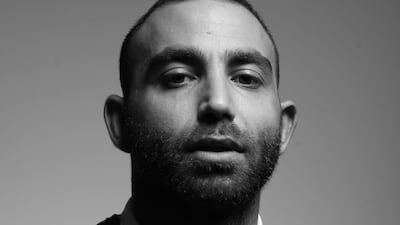Joseph Achajian is, perhaps, his own best customer. As the founder of the Beirut menswear brand Maison Du Mec, (House for Men), Achajian is familiar with the endless search for the perfect outfit.
“I used to be a shopaholic and would spend my entire month’s salary on clothing. I had to have a new outfit every single day,” he says. “I went through different styles, from flamboyant to preppy, street style and then the biker look, but I always wanted something different from everyone else.”
His eye for style is no accident, having grown up in Lebanon in a family immersed in retail. “My great grandparents, on both sides, worked in clothing and tailoring, mainly in children’s wear, and my mother’s family had the biggest factory for manufacturing children’s wear in the region.”
Surrounded by such expertise, it is little surprise that he and his sibling were always impeccably turned out as children. “Our clothes were always tailored, and we were not allowed to wear T-shirts as they were considered too informal,” he laughs.
Despite this, he explains that his dream of studying fashion was simply not an option. “Growing up Armenian, I was not allowed. Between my brother and me, one of us needed to be an engineer and the other a doctor,” he says.
Undeterred, he took a more circuitous route, taking a sales job at a fashion retailer while studying biology at university. He worked his way up from the shop floor to visual merchandiser. “When I graduated from my master’s, I got headhunted by [the Lebanese department store] ABC to be its visual merchandiser, and then a few years later, by Harvey Nichols in Riyadh for the same role. I eventually ended up as a buyer, attending all the fashion weeks.”
In due course, he felt compelled to start his own label, and in 2018, he moved back to Beirut to launch Maison Du Mec. His years in retail taught him to build it slowly. “We started very small with only tops and trousers. And I was very lucky because for my first collection, I was able to showcase it in ABC, and I was selling from my own home.”

Each season, Achajian has added new components. “It moved to suits, then coats, then shirts. We added shoes, and now we have become a brand that has every single category – clothing, footwear, accessories, jewellery, leather goods, and even a small collection of candles. It’s more of a lifestyle.”
Maison Du Mec is renowned for its sleek, minimal aesthetic, featuring a palette dominated by black and white. “Attending New York Fashion Week for years, I learnt that you look at the flamboyant guy for five seconds, but you are intrigued by the man wearing all black in the corner,” he says.
“So that’s why I did a brand that is only black and white – as men, that’s what we want.”
He describes the brand’s goal as “intriguing”. “We want a minimal approach that is different,” he says. While the focus is on tailoring, everything comes with a unique twist. A dress shirt, for example, is oversized, giving it a touch of street style, while knitwear is cropped into harness-style bibs.
“I really started enriching the men’s wardrobe with items that cannot be found every day, in a way that is very chic, yet has this edge to it,” he says.
The Maison du Mec suit, meanwhile, is a hybrid between a tuxedo and a belted smoking jacket for a languid, loose fit that is tied at the waist with a belt. The result is laid-back and incredibly chic.
“As someone who has been wearing a tuxedo since I was 15, I needed something different that is elegant and chic and that I can attend an event in, yet can be worn by anyone in the region.”
In 2022, the brand took part in Dubai Fashion Week (then called Arab Fashion Week), prompting a brief flirtation with colour, and a women’s line, although the latter has now been put on ice. “I discovered that our women clientele prefer to wear the menswear. We have a couple of evening gowns, but we will leave it there.”

Despite his desire to fold subversion into menswear, underneath, he says his clothes are made to be versatile. “If you remove the belt, this is a normal suit. Our trousers are high-waisted, Italian-cut trousers. I don’t use Chinese poplin; I use Italian poplin. I don’t want people to buy my merchandise to wear it for one season and throw it away. I want to make versatile pieces that people can wear for years.”
Now, his eye is on the international market, with plans to show at Pitti Uomo – the prestigious menswear trade show in Florence. Having grown up in Lebanon, he is all about moving forward.
“I was raised in a civil war, and then I witnessed another war, and then another war and then the huge explosion – it’s a lot for one person to handle in 39 years, but as Lebanese, you learn you have to stand up on your feet very quickly and just go again.”

